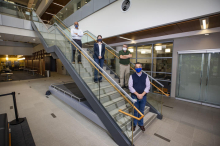Kentucky Neuroscience Institute Leading the Way in New Treatment Improving Quality of Life for Complex Epilepsy Patients
LEXINGTON, Ky. (Nov. 4, 2020) – In America, 3.5 million people have epilepsy. Approximately one in 26 people in the United States will develop epilepsy at some point in their lifetime. In Kentucky, more than 2% of the population is living with this neurologic condition characterized by unpredictable seizures.
College of Medicine Pride Week Encourages 'Lasting Culture of LGBTQ* Support and Visibility'
LEXINGTON, Ky. (Nov. 2, 2020) — The University of Kentucky College of Medicine celebrated the LGBTQ* community this fall during its first annual Pride Week, made possible through a collaboration among the college’s Office of Diversity, Equity, and Inclusion, its newly established LGBTQ* Advisory Committee, and the UK medPRIDE student organization.
The UK College of Medicine hosted four days of events that gathered feedback, shared important local resources, and displayed the college’s commitment to continued progress toward inclusivity.
Multi-Million Dollar Multidisciplinary Grant Supports Advancement of Epilepsy Research
LEXINGTON, KY. (Oct. 27, 2020) — A $2.9 million grant from the National Institutes of Health (NIH) is supporting a multidisciplinary team of University of Kentucky researchers in continuing their work to find therapeutic strategies to resolve neurovascular inflammation and repair blood-brain barrier dysfunction in epilepsy.
UK Study Shows FDA-approved Leukemia Drug May Help Treat Metastatic Melanoma
A new study led by researchers at the University of Kentucky Markey Cancer Center and UK Department of Pharmacology and Nutritional Sciences demonstrates the potential benefit of using an anti-leukemic drug nilotinib – most commonly used to treat chronic myelogenous leukemia – to overcome therapy resistance in metastatic melanoma.
Drs. Aman Khurana and Fanny Chapelin receive Early Career Research Award at Society of Radiologists in Ultrasound (SRU) 2020
Young Library Shines Purple to Bring Awareness to Alzheimer’s and Caregivers
LEXINGTON, Ky. (Nov. 2, 2020) — In celebration of National Alzheimer’s Disease Awareness Month and National Family Caregiver’s Month, from Wednesday, Nov. 4 to Friday, Nov. 6, the William T. Young Library will shine purple to show the University of Kentucky's commitment to a world without Alzheimer's disease and to commemorate the important work done by caregivers.
10th Annual Barnstable Brown Diabetes and Obesity Research Series Taking Place Virtually
Each year at the Barnstable Brown Diabetes Center – Diabetes and Obesity Research Day, researchers from the University of Kentucky and other regional institutes share their current findings and ongoing research about the alarming rise in obesity and diabetes rates. Presenters also discuss prevention and treatment of these epidemic-level diseases.
UK Announces Inaugural Class of AARTS Scholars
Dr. Fareesh Hobbs Kanga Leads Successful Transition of Clerkship to Virtual Learning
When students at the University of Kentucky were sent home last spring as a precaution early in the COVID-19 pandemic, Fareesh Hobbs Kanga, MD, faced a pair of significant challenges.
Dr. Kanga, psychiatry clerkship director and assistant professor of psychiatry at the University of Kentucky College of Medicine, had two courses approaching that needed to be converted to virtual learning, and on a tight deadline.








